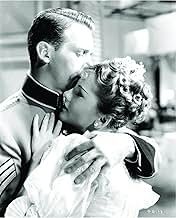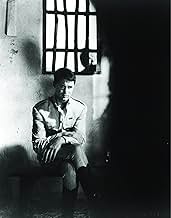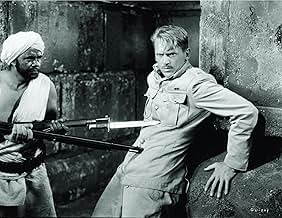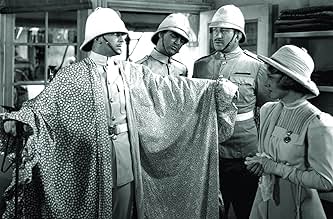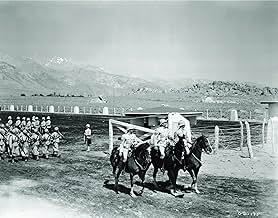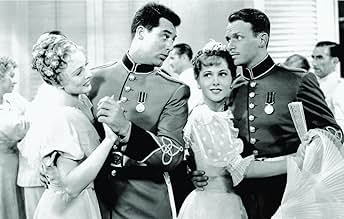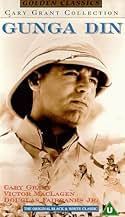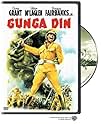Gunga Din
- 1939
- Tous publics
- 1h 57min
NOTE IMDb
7,2/10
13 k
MA NOTE
En Inde, au XIXe siècle, trois soldats britanniques et un porteur d'eau indigène doivent empêcher une renaissance massive et secrète du culte meurtrier des Thuggee avant qu'il ne puisse se r... Tout lireEn Inde, au XIXe siècle, trois soldats britanniques et un porteur d'eau indigène doivent empêcher une renaissance massive et secrète du culte meurtrier des Thuggee avant qu'il ne puisse se répandre dans tout le pays.En Inde, au XIXe siècle, trois soldats britanniques et un porteur d'eau indigène doivent empêcher une renaissance massive et secrète du culte meurtrier des Thuggee avant qu'il ne puisse se répandre dans tout le pays.
- Réalisation
- Scénario
- Casting principal
- Récompenses
- 4 victoires au total
Charles Bennett
- Telegraph Operator
- (non crédité)
Gene Coogan
- Lancer
- (non crédité)
Jimmy Dime
- Thug
- (non crédité)
George Du Count
- Pandu Lal
- (non crédité)
Anna May the Elephant
- Elephant
- (non crédité)
Avis à la une
Among my father's favorite movies that I remember were High Noon, Four Feathers (both Korda's and the silent version), and this one. Not surprisingly they've all become favorites of mine. They are certainly the "guy flicks" of their day that wouldn't stand a chance of being made that way today. But I guess that's what makes them classics never to be forgotten, because, although all are classic stories, destined to be told again and again, they'll never be recreated in the original ways that made them classics.
Gunga Din has it all, and all, although dated and unapologetically un-PC, great stuff. To all the on target comments written about this movie, let me just add, the scenes leading up to and including the final battle are among the most moving in cinema. A gem of a movie. I can't hear the stir of (undeservedly unappreciated and maligned) bagpipes without remembering the thrill of this picture. It's timeless and wonderful.
Gunga Din has it all, and all, although dated and unapologetically un-PC, great stuff. To all the on target comments written about this movie, let me just add, the scenes leading up to and including the final battle are among the most moving in cinema. A gem of a movie. I can't hear the stir of (undeservedly unappreciated and maligned) bagpipes without remembering the thrill of this picture. It's timeless and wonderful.
This old film just has some important elements the bulk of current films seem to lack: strength of character, genuine heroism and an understanding of what true altruism and sacrifice mean. And Sam Jaffe, a terrific (now-unfortunately-deceased) character actor breaks the viewer's heart as the "regimental bhisti, Gunga Din," who takes constant abuse and gives his all, including his life, to carry water to the men of the Queen's regiment even in the thick of battle.
Funny, I don't remember it as a comedy, though I think there may have been some spots of humor in it, but then, I was rather young the last time I saw it on the Late, Late Show... too many years ago to even want to think about.
It's a wonderful movie and I hope the animated version, coming out next year, does the poem and story the same good service the 1939 film managed to do.
Highly recommended.
Funny, I don't remember it as a comedy, though I think there may have been some spots of humor in it, but then, I was rather young the last time I saw it on the Late, Late Show... too many years ago to even want to think about.
It's a wonderful movie and I hope the animated version, coming out next year, does the poem and story the same good service the 1939 film managed to do.
Highly recommended.
While it is fashionable in too many circles to condemn anything which portrays European colonialism generally, and the British Empire specifically, in a favorable light, a little historical knowledge will show that Kipling's story, as well as this superb film, are hardly the reactionary racist screed some would like to demote them to. Gunga Din is a regimental bhisti - a water carrier - and in 19th century India that meant that he had a job which guaranteed a place to sleep and food in a very brutal society. Considering that he was also an "untouchable" - a member of India's lowest caste - this was something. Colonel Weed is correct in saying "he had no official status as a soldier" - bhistis were non-military auxiliaries. As for his loyalty to the British, there were many Indians who clearly preferred British rule to that of their fellows - and not just the maharajas and princes.
If you read the story - and watch the movie with an objective eye - at the end, all the major characters have nothing but respect for Gunga Din. Sergeant MacChesney (Victor McLaglen) is clearly shamed by the fact that Din, in the end, was not only the better soldier but the better man - he sacrificed himself to prevent the ambush and massacre of the British column. The most telling example that the movie doesn't "put down" Gunga Din is at the end when Colonel Weed posthumously appoints the former regimental bhisti as a Corporal in the regiment. Corporal was a BRITISH rank - the equivalent Indian rank was Havildar. So, he was appointed as a BRITISH non-commissioned officer who could command British troops - hardly an example of political incorrectness.
Yes, this is "men-as-buddies" flick. However, this movie has a special appeal to anyone who has actually served in the military - those are the types of friendships you make (you'll share your last drop of water with your mess mate) and keep for the rest of your days. It acknowledges that. So enjoy it - it is a rousing tale - and keep the PC-nonsense out of it. The bad guys lose in the end while the best man is recognized for his virtues - you don't even get that it in real life.
If you read the story - and watch the movie with an objective eye - at the end, all the major characters have nothing but respect for Gunga Din. Sergeant MacChesney (Victor McLaglen) is clearly shamed by the fact that Din, in the end, was not only the better soldier but the better man - he sacrificed himself to prevent the ambush and massacre of the British column. The most telling example that the movie doesn't "put down" Gunga Din is at the end when Colonel Weed posthumously appoints the former regimental bhisti as a Corporal in the regiment. Corporal was a BRITISH rank - the equivalent Indian rank was Havildar. So, he was appointed as a BRITISH non-commissioned officer who could command British troops - hardly an example of political incorrectness.
Yes, this is "men-as-buddies" flick. However, this movie has a special appeal to anyone who has actually served in the military - those are the types of friendships you make (you'll share your last drop of water with your mess mate) and keep for the rest of your days. It acknowledges that. So enjoy it - it is a rousing tale - and keep the PC-nonsense out of it. The bad guys lose in the end while the best man is recognized for his virtues - you don't even get that it in real life.
'Gunga Din' is the kind of film you cherish after the first viewing and then want to revisit from time to time. It stays in the memory and for valid reasons--the casting is perfect with the three buddies entering into the spirit of the whole thing--the perfect buddy movie. Cary Grant gave many fine performances on film but this is one of his greatest--heroic and funny at the same time. Sam Jaffe is excellent as the water carrier who eventually saves the regiment in what has to be one of the most thrilling endings ever conceived for an action movie. Today some of it is politcally incorrect but this is a minor flaw in a great movie. Douglas Fairbanks, Jr., Victor McLaglen and Eduardo Ciannelli are all perfectly cast. Joan Fontaine has a couple of brief scenes as the only femme in the story--but fails to ignite any interest in her bland role. Based on the famous Rudyard Kipling poem, it deserves a place at the top of the list of great adventure films produced in the 1930s. I'd love to see a technicolor version today with someone like Brendan Fraser leading the "musketeers". A real gem.
Although I'm usually only mildly appalled reading through user comments on movies on imdb.com some of the comments made here about this classic movie exhibit a true nadir of ignorance of history in general and movies in particular. E.g.;
1 - I'm particularly struck by the comment - "This movie is shot on location in California because shooting in India would have been too expensive." Prior to the 1950's Hollywood movies were rarely (and I mean rarely) shot on the original location sites. The problem was not expense (although the moguls certainly were pinching the pennies), the problem was transportation! Transporting a movie production company halfway around the world would have been nearly impossible to accomplish (let alone how long it would have taken and then they would have been shooting under impossible conditions in India anyway) not to mention that WWII was on the verge of breaking out! The biggest movie of that year was shot on a set in Culver City, CA where they could easily manipulate the filming. Even if they had sent the production company to Atlanta they couldn't very well burn down Atlanta for authenticity' sake now could they? They would have had to have built a set(s) in Atlanta - why would they go all the way across the country to do that when they could do it Culver City?
2 - Several people lament that Gunga Din was not shot in color. A little movie history context here - first of all, the first full length feature film shot in color had only been done 4 years earlier, secondly three-strip technicolor was outrageously expensive in 1939 (only one other movie was shot that year in technicolor and it didn't start making back its costs until the late 1960's) and the few features shot prior to that year in color had failed miserably to make back their production costs. And finally, the studios had no faith in color (just as they had resisted "talkies" a decade earlier) - they were in business to make money, not experiment with an innovation that had not yet been accepted and proven to bring in a bigger audience. Also, there was a comment about the graininess of the B&W cinematography of GD - that's because 99% of the present day viewers are seeing multi-generation copies that have been played to death! Get a fresh, first generation copy to see the B&W shading in its true brightness, focus and clarity and that objection will go away. BTW - the colorized version of GD is abysmal - faded coloring effects and indistinct edges make it look like a sloppy water color painting!
3 - Labelling anything from the past as not being PC only shows the lack of historical context knowledge so rampant in the present day. First of all this movie was loosely based on a poem that was already 47 years old when this movie was released. If you change the politics to match the present day conception of "correctness" then you really don't have the original concept do you? Not to mention that America was a far different place racially (and socially) in 1939. There are movies being released in 2003 that will catch hell 50 years from now for their "politics" - just chalk it up to the ignorance of future generations to not recognize what the history of the times were. I do like the analysis by one writer though that far from being a reactionary screed the movie went further than the poem in emphasizing that Gunga Din was far better off in his position than he would have been otherwise. After all, he was an "untouchable", a social postion that was abused, exploited and terrorized by their fellow Indians for thousands of years. Whatever one might think of his treatment by the British it was a high step up from what he would have endured out in his own society! Which brings me to.........
4 - ..........the ridiculously misguided (and just plain wrong) observations about the Thuggees of India being "freedom fighters", this couldn't be more wrong. Several of the commentators really need to read up on Indian history - the Thuggees had been ritualistic murderers and thieves for thousands of years in India before the British ever arrived! If they had any support from various rulers of parts of India it was because those rulers either feared for their own positions or they could get the Thuggees to do their dirty work for them - for a high price of course. The Thuggees reputation for brutality, unabated crimes of the worst kind and general, overall lack of human attributes make most other singlemindedly evil groups throughout history (even in the present day) look like amateurs! The reason they fought the British so vociferously was that the British recognized this and fought to suppress them - I seriously doubt that many Indians lamented that suppression. And to the person who equated the Thuggees with French Resistance fighters killing "collaborators" - where did you get such a preposterous idea? Do you know anything at all about the history of the Indian sub-continent?
Let me also point out here that it is the British who are the infidels not the "natives", just another example of how mixed up one can be about who is who and understanding what history and meaning really are.
I especially love the reviewers who spend their time comparing this to another movie that they like better in order to dis this one - so they review the other movie instead. Why bother, movies stand on their own, you either like them or you don't, go watch the other one you like instead.
5 - Now, everyone is entitled to their opinion, which I certainly support, as to whether this is a "good" or a "bad" movie (opinions are like.......well, you know) but fergawdsakes base that opinion on an informed knowledge of the times, the historical context of the work and the realization that movies are just movies - they aren't "real" and they certainly make up whatever "truth" and "facts" they see fit!
My opinion? This is one of the great "entertainment" movies ever made - the reason to go to the movies I thought? It has everything - a good script, a good story, epic sweep, fantastic acting, inter-character chemistry, charisma, pacing and coherency. How many movies can you say that about? And kudos to those who see this movie for what it is, not what they want it to be!
1 - I'm particularly struck by the comment - "This movie is shot on location in California because shooting in India would have been too expensive." Prior to the 1950's Hollywood movies were rarely (and I mean rarely) shot on the original location sites. The problem was not expense (although the moguls certainly were pinching the pennies), the problem was transportation! Transporting a movie production company halfway around the world would have been nearly impossible to accomplish (let alone how long it would have taken and then they would have been shooting under impossible conditions in India anyway) not to mention that WWII was on the verge of breaking out! The biggest movie of that year was shot on a set in Culver City, CA where they could easily manipulate the filming. Even if they had sent the production company to Atlanta they couldn't very well burn down Atlanta for authenticity' sake now could they? They would have had to have built a set(s) in Atlanta - why would they go all the way across the country to do that when they could do it Culver City?
2 - Several people lament that Gunga Din was not shot in color. A little movie history context here - first of all, the first full length feature film shot in color had only been done 4 years earlier, secondly three-strip technicolor was outrageously expensive in 1939 (only one other movie was shot that year in technicolor and it didn't start making back its costs until the late 1960's) and the few features shot prior to that year in color had failed miserably to make back their production costs. And finally, the studios had no faith in color (just as they had resisted "talkies" a decade earlier) - they were in business to make money, not experiment with an innovation that had not yet been accepted and proven to bring in a bigger audience. Also, there was a comment about the graininess of the B&W cinematography of GD - that's because 99% of the present day viewers are seeing multi-generation copies that have been played to death! Get a fresh, first generation copy to see the B&W shading in its true brightness, focus and clarity and that objection will go away. BTW - the colorized version of GD is abysmal - faded coloring effects and indistinct edges make it look like a sloppy water color painting!
3 - Labelling anything from the past as not being PC only shows the lack of historical context knowledge so rampant in the present day. First of all this movie was loosely based on a poem that was already 47 years old when this movie was released. If you change the politics to match the present day conception of "correctness" then you really don't have the original concept do you? Not to mention that America was a far different place racially (and socially) in 1939. There are movies being released in 2003 that will catch hell 50 years from now for their "politics" - just chalk it up to the ignorance of future generations to not recognize what the history of the times were. I do like the analysis by one writer though that far from being a reactionary screed the movie went further than the poem in emphasizing that Gunga Din was far better off in his position than he would have been otherwise. After all, he was an "untouchable", a social postion that was abused, exploited and terrorized by their fellow Indians for thousands of years. Whatever one might think of his treatment by the British it was a high step up from what he would have endured out in his own society! Which brings me to.........
4 - ..........the ridiculously misguided (and just plain wrong) observations about the Thuggees of India being "freedom fighters", this couldn't be more wrong. Several of the commentators really need to read up on Indian history - the Thuggees had been ritualistic murderers and thieves for thousands of years in India before the British ever arrived! If they had any support from various rulers of parts of India it was because those rulers either feared for their own positions or they could get the Thuggees to do their dirty work for them - for a high price of course. The Thuggees reputation for brutality, unabated crimes of the worst kind and general, overall lack of human attributes make most other singlemindedly evil groups throughout history (even in the present day) look like amateurs! The reason they fought the British so vociferously was that the British recognized this and fought to suppress them - I seriously doubt that many Indians lamented that suppression. And to the person who equated the Thuggees with French Resistance fighters killing "collaborators" - where did you get such a preposterous idea? Do you know anything at all about the history of the Indian sub-continent?
Let me also point out here that it is the British who are the infidels not the "natives", just another example of how mixed up one can be about who is who and understanding what history and meaning really are.
I especially love the reviewers who spend their time comparing this to another movie that they like better in order to dis this one - so they review the other movie instead. Why bother, movies stand on their own, you either like them or you don't, go watch the other one you like instead.
5 - Now, everyone is entitled to their opinion, which I certainly support, as to whether this is a "good" or a "bad" movie (opinions are like.......well, you know) but fergawdsakes base that opinion on an informed knowledge of the times, the historical context of the work and the realization that movies are just movies - they aren't "real" and they certainly make up whatever "truth" and "facts" they see fit!
My opinion? This is one of the great "entertainment" movies ever made - the reason to go to the movies I thought? It has everything - a good script, a good story, epic sweep, fantastic acting, inter-character chemistry, charisma, pacing and coherency. How many movies can you say that about? And kudos to those who see this movie for what it is, not what they want it to be!
Le saviez-vous
- AnecdotesThe gong in the title sequence is the same one used to summon King Kong six years earlier.
- GaffesIn every scene with the snake pit, the strings making them move are visible.
- Citations
Sgt. Thomas 'Tommy' Ballantine: You displease me greatly, and I ignore the both of you.
- Crédits fousThe credits appear on a gong. Standing next to the gong is a Hindu man, and every time he strikes the gong, the credits change.
- Versions alternativesGerman theatrical version was cut by approx. 12 minutes. This version was later shown on TV but never released on any home media format. Only in 2018 the film was released on DVD, with approx. 4 minutes restored.
- ConnexionsFeatured in Les Corps sauvages (1959)
Meilleurs choix
Connectez-vous pour évaluer et suivre la liste de favoris afin de recevoir des recommandations personnalisées
- How long is Gunga Din?Alimenté par Alexa
Détails
- Date de sortie
- Pays d’origine
- Langue
- Aussi connu sous le nom de
- Aufstand in Sidi Hakim
- Lieux de tournage
- Société de production
- Voir plus de crédits d'entreprise sur IMDbPro
Box-office
- Budget
- 1 910 000 $US (estimé)
- Durée
- 1h 57min(117 min)
- Couleur
- Rapport de forme
- 1.37 : 1
Contribuer à cette page
Suggérer une modification ou ajouter du contenu manquant


